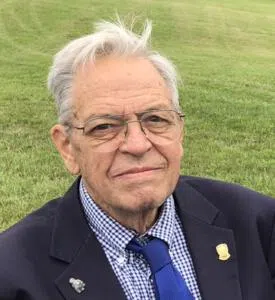Dr Frederick Martin (Fritz) Phelps III, age 91, died peacefully at his son’s home in Holland Michigan on September 24th, 2024. Frederick was born on June 11th 1933 in Grand Rapids Michigan, son of Frederick Martin Phelps Jr. and Alice Elizabeth Kellogg. He married Marion Louise Riley on March 2nd, 1957 at Jefferson Avenue Presbyterian Church in Detroit. They had been married for 66 years when Marion passed away in July 2023.
Fritz is survived by his three children: Fred (Li Li) Phelps IV, Dorothy (Andrew) Gellai, and Rick (Emily) Phelps; eight grandchildren: Wu Hao (Charlene) Phelps V, Xinyan Phelps, Kaile (Ashlyn) Phelps, Paul Gellai Jr., Matthew Gellai, Lilia Phelps (Omar Moreno-Gill), Galina Phelps, Vladimir Phelps; and four great grandsons, with another one on the way; his sister Margaret Swanson, and several nieces and nephews. He was preceded in death by his parents, his wife, and brother-in-law Lt. Col. Stanley R. Swanson, USAF.
In 1942 his family moved to Spokane. As a boy he worked a paper route, started a lawn care business, played trombone and was involved in a square-dancing club. He joined Boy Scouts and reached the rank of First Class. His father often took him trout fishing in icy streams, which caused him to hate fishing! Fritz graduated from Lewis and Clark High School in 1951.
Fritz graduated from Carleton College in 1955 with a B.A. in Physics. In 1958 he received an M.S. in Physics from the University of Michigan and in 1963 received his Ph.D. in Physics from the University of Alberta. He taught at Kalamazoo College, the University of Alberta, the Detroit Institute of Technology, the University of Michigan, and, for 42 years, was Associate Professor of Physics at Central Michigan University (1970-2012).
In 1956 Fritz received a draft notice from President Eisenhower and served in the U.S. Army Chemical Corps for two years.
His research specialty was atomic spectroscopy, and in 1983, after 20 years of work, he published the MIT wavelength Tables Volume 2 containing over 300,000 data. As he liked to say, his book had no grammatical errors, “but it sure contains a lot of numbers.”
The greatest joy of his teaching career was to have a pre-med student pass the entrance examinations for medical school and tell him, “I took the MCAT, and physics was the easiest part.”
In 1938 his family was asked to babysit his uncle’s dog Heathery. This began a lifelong love of dogs. After Heathery came Honey. After Fritz was married, Marion only once allowed a dog in the family, a “blonde” cocker spaniel named Ginger who became his best friend and the leading character on his physics exams. His love of dogs extended to love of wolves in the wild.
In 1980, Fritz and Marion along with about 200 others, founded Mt. Pleasant Community Church for which he served as Chairman of the Board of Trustees and sang in the choir. Every year at Vacation Bible School he served as a theme character along with his aforementioned blonde cocker spaniel Ginger, until she died at age 127 (dog years).
He was the founding Scoutmaster of Troop 628 and served for 34 years. During his tenure 34 boys earned the rank of Eagle. He took his role as Scoutmaster very seriously indeed, always pushing the boys to do amazing things. Cooking at scout camp involved things like preparing Cornish game hens over trenches of live coals. He loved knot boards and lashing projects, scout uniforms, and blowing reveille on the bugle to wake everyone up at camp. Each scout burned his name on a disc of cedar wood which was hung under the boy’s rank. At Courts of Honor, a scout would move his disc to a higher rank upon receiving a promotion. Fritz’s exemplary service was publicly recognized in 1987 when he received the Silver Beaver, Scouting’s highest award for adult volunteers.
The Depression and World War II made a huge impact on him as a young child. He had a large collection of books devoted to the war and in his later years was always interested in watching documentaries on the subject. A favorite book, the Manhattan Project, which he read to his eldest son, told the story of the development of the first atomic bomb. Like many Depression-era children, he saved everything, filling his basement to the brim as the years passed. He sorted screws and bolts by size, storing them in baby food jars lined up neatly in rows on tiny shelves.
Perhaps most of all, he enjoyed anything relating to the Canadian and Alaskan far north; stories about wolves, sled dogs, voyageurs, and the midnight sun. His favorite book was “In the Shadow of a Rainbow,” a remarkable story about a native American and his close relationship with a wolf pack.
He was deeply conservative and fiercely anti-communist. He cherished American freedom and never trusted the government. He embodied the Protestant work ethic, teaching physics until he was unable to continue at age 79.
His biggest project was building his (or was it Marion’s?) dream house on the banks of the Chippewa River. The lion’s share of the work was done in the summer of 1971 by Fritz and a team of graduate students and other riff raff, and his family was able to move into a cold corner of the basement on his 15th wedding anniversary in March of 1972. After huddling around an electric heater for a few weeks, both the weather and housing conditions improved.
After the initial push, he did everything himself, like using self-built scaffolding and ropes to shingle the roof and brick the walls. However, Marion always maintained that the house project was never quite finished! Nevertheless, his entire family has many fond memories of the home.
His adventure reading gave birth to much travel: cross-country car camping trips to visit his parents on Orcas Island in Washington, a family canoe trip down Utah’s Green River, and Scout and family canoe trips in Ontario. True to form, and despite being deep in the wilderness, he successfully baked a birthday cake in a Dutch oven for his daughter’s birthday.
In his later years his children took him on road trip adventures to the Rocky Mountains, around Lake Superior, to James Bay, and an 8200-mile trip to realize his childhood dream of driving the Alaska Highway. Even in his last months, his children drove him to Indianapolis for the April 8th total eclipse of the sun.
He was a lifelong story teller. Some of his best (and worst) material is available in his memoirs entitled Don’t Never. A second volume may soon be published.
In many ways Fritz was a hands-on “working class academic.” While highly educated, he loved spending time with people from a more “blue collar” background like auto mechanics, hardware clerks and barbers. Even after being moved to Holland in his later years, he would return to Cook’s Barber Shop in Mt. Pleasant, a great place for story-telling.
A memorial service is planned at Community Church of Mt. Pleasant on Friday October 18th, 2024 with visitation beginning at 11:00 and the service at 12:00 noon, followed by lunch. In lieu of flowers, donations may be made to Covenant Presbyterian Church in Holland, Community Church of Mt. Pleasant, or Hospice of Holland.
Arrangements are by the Dykstra Funeral Home-Mulder Chapel.






Comments